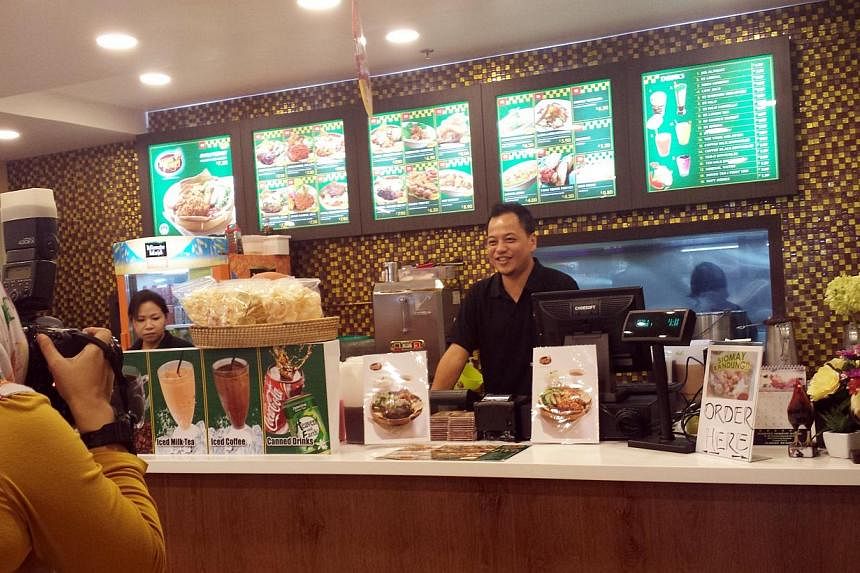A bowl of mee bakso - beefball noodles - at Indonesian food chain Es Teler 77 in Singapore 10 years ago inspired Mr Edy Ongkowijaya, a Nanyang Polytechnic graduate, to start his own food business in the Lion City.
"It was so hard to find any food that reminded me of home back then. It took me one hour by bus to get to a bowl of mee bakso at Es Teler 77 in Joo Chiat Road. This is a business opportunity, I told myself," Mr Edy, an Indonesian who has been living in Singapore since he was 16, told The Straits Times.
A year later, he and a business partner bought a franchise from Batam's Ayam Penyet Ria and opened an outlet in Lucky Plaza, where many Indonesians gather on weekends, to sell ayam penyet, or flattened fried chicken. It was a priceless experience: They learnt that there were many locals who also visited their outlet.
Three years later, Mr Edy broke up with his partner and pulled out of the franchise contract to go it alone.
He set up a new chain of foodcourt stalls called Dapur Penyet in 2008, opening outlets in heartland areas to target Singaporeans. Its first outlet was in Jurong Point, and there are now 10 others in places such as Clementi Mall and Tiong Bahru.
He is considered by many as the first person to introduce ayam penyet to Singapore.
"I don't want to rely on just Indonesian customers," said the 37-year-old. "Indonesian and Singaporean customers have things in common - they love spicy food and they love chicken."
Singapore is also a stepping stone for the chain to the region: Dapur Penyet entered Malaysia in 2009 and Brunei earlier this year.
The success of ventures like Mr Edy's has inspired other Indonesian chains to follow suit over the years.
It represents the other side of a trend that began a decade ago when Singapore bakery chain BreadTalk set foot in Indonesia in 2003 and rapidly expanded, with more than 90 outlets today. Old Chang Kee and others followed suit, tapping growing demand and the familiarity that Indonesians - who make up the largest group of visitors to the city state - have with Singapore food.
And more Indonesian food outlets have expanded into or plan to enter the Singapore market.
"Compared to Indonesia, competition in the food business is very tight in Singapore, but local residents have been receiving Indonesian food quite well," said Mr Simon Soekarno, a counsellor at the Indonesian Embassy in Singapore.
In recent years, a wider range of Indonesian food chains has started branches or franchises in Singapore, among them Ny Nita pressure-cooked fried chicken, Sari Ratu nasi padang, Java Kit-chen, Indonesian Delight and J.Co Donuts.
While many are well known among Singaporeans, they also count among their customers the 200,000 Indonesians living in Singapore and the more than three million who visit each year.
Indonesia's largest kebab chain Baba Rafi is gearing up for its Singapore opening, slated for the middle of next year. It now has 1,200 outlets in Indonesia, 29 in Malaysia, 14 in the Philippines and one in China, and employs 1,500 staff.
"Now, we see opportunity in opening up in Singapore and we don't want to miss it," Baba Rafi owner Hendy Setiono told invesment portal Bareksa.com.
Baba Rafi might be a lateco-mer, but doughnuts and coffee chain J.Co is not. It has been
using Singapore as a test bed for overseas expansion, opening its first outlet here in 2007 before going to Malaysia in 2008 and the Philippines in 2012.
J.Co is opening its fourth outlet in Singapore, at Suntec City mall, this Friday.
"J.Co seeks to be an international brand and Singapore is the perfect gateway to achieve that," said spokesman Gita Herdi Hastarani.
She laments that doing business in Singapore can be challenging, with high rents and labour costs.
But she sees an upside to doing business in the city state.
"We really appreciate the Singapore Government being business-friendly, with transparent, systematic and responsive regulations," she said.

